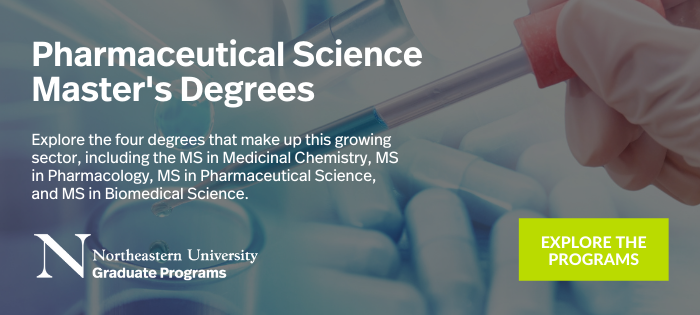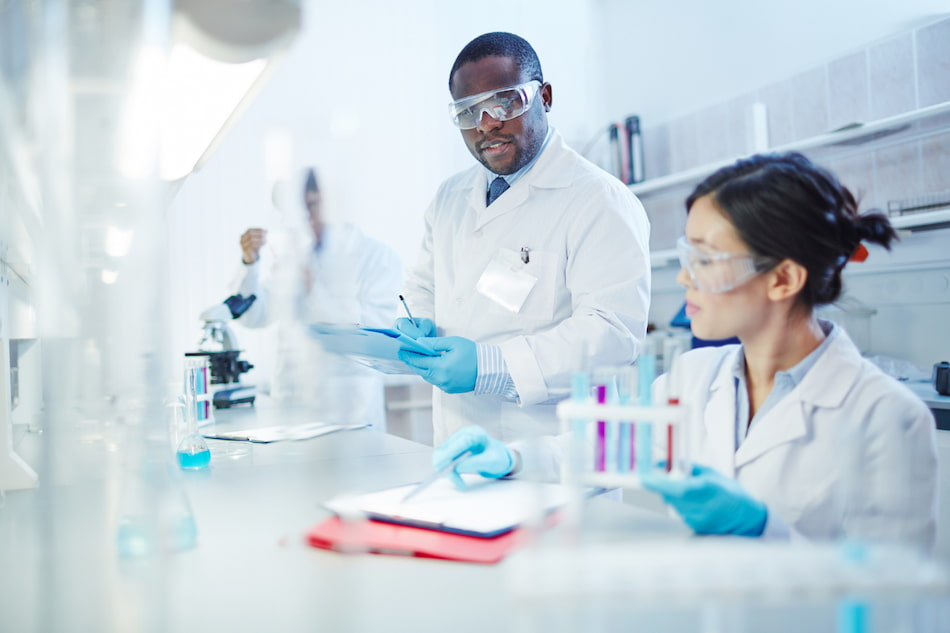Are you interested in the research and development of pharmaceutical treatments that could improve a patient’s quality of life—or save it all together? Do you have a passion for laboratory work, including the design and execution of experiments? Are you interested in making your mark on the field of medicine and healthcare?
For many individuals, a career as a pharmaceutical scientist is the perfect means of achieving these and other goals.
Below, we explore some of the most common duties performed by pharmaceutical scientists and outline a concrete series of steps that you can follow to kickstart your career in the field today.
What do pharmaceutical scientists do?
Pharmaceutical scientists are individuals who perform a variety of tasks related to the research, discovery, development, and testing of drugs and other pharmaceutical treatments. They are most commonly employed by pharmaceutical and biotechnology companies, though they can also work in other fields such as government lobbying, as well.
While the precise duties that a pharmaceutical scientist performs on a daily basis will vary substantially depending on the size of the lab team and the employer, they often include:
- Collecting and analyzing data about the use and efficacy of treatments in various stages of preclinical development
- Collaborating with members of the lab team, as well as other stakeholders not directly involved in preclinical research (such as marketing or legal)
- Designing and executing experiments to determine the specific mechanisms responsible for how a drug functions
- Testing and optimizing compounds and the means to deliver them to patients to improve their safety and efficacy while reducing the risk of adverse outcomes
Below we explore a number of specific steps that you can follow to make this career your reality.
How to Become a Pharmaceutical Scientist
1. Explore your interests.
Before you begin down any career path, you should first ensure that it is something that truly interests you and aligns with your personal and professional goals.
“I think the first step [in becoming a pharmaceutical scientist] is having an innate interest in living systems, health, and disease,” says David Janero, director of Northeastern’s pharmaceutical sciences graduate programs. “It takes an innate spirit of inquiry to look into this field and be motivated to help address health problems from the standpoint of therapeutics invention.”
Advance Your Career with a Master’s in Pharmaceutical Science
Learn how to transform your career in an industry that’s transforming the world.
This is also an excellent opportunity to determine exactly what you want your career to look like, and to consider the various paths you might take to get there. For example, do you want to become a pharmaceutical scientist or a pharmacist? While these job titles may sound similar, they are in fact very different—and it’s important to understand those differences before you commit yourself to the wrong career.
2. Pursue the required education.
The next step in becoming a pharmaceutical scientist is to complete the education required to work in the field. At a minimum, this means completing a bachelor’s degree in a related area of study, such as a bachelor of science in pharmaceutical sciences (BSPS). But, according to Janero, there is a trend amongst employers to prefer candidates who hold master’s degrees.
“The reason for this trend is that the master’s degree really provides a demonstration that students can cope with more advanced ideas and thinking in the field,” Janero says. “It shows that they’re familiar with more complex concepts and that they have studied these things in a bit more depth than what would be covered in, say, an undergraduate education, which may be more broad, more general.”
In researching potential degrees, you might find that there are a number of potential master’s degrees that might prepare you for a job as a pharmaceutical scientist. The one that is most directly aligned with the career is the Master of Science in Pharmaceutical Sciences, which is specifically designed to prepare students for a career in drug development and delivery.
At Northeastern, the main goal of the MS in Pharmaceutical Sciences is to educate students so that they understand how the chemical and physical properties of drugs and their dosage forms can affect therapeutic performance in both healthy and diseased systems. Students graduate as specialists in pharmaceutics, capable of leveraging their training to improve drug targeting, action, and safety.
Four potential concentrations—including novel drug delivery systems, biopharmaceutics and pharmacokinetics, physical pharmacy and polymeric dosage form development, and drug metabolism—allow students to delve deep into the specific area that aligns best with their interests and career goals.
Despite the benefits of a master’s in pharmaceutical sciences, there are other graduate-level degrees that can also lay the requisite foundation necessary for a successful career in drug discovery. These include a Master of Science in Biomedical Sciences, a Master of Science in Pharmacology, or a Master of Science in Medicinal Chemistry.
Learn More: What Can You Do With a Master’s in Pharmacy?
3. Develop your skills.
Both during and after earning your degree, it’s critical that you work toward building the skills that employers look for when hiring. According to Janero, these skills fall into two broad buckets: lab skills and soft skills.
“[The first] is the laboratory skills that you bring to the bench in terms of wet lab experimentation,” Janero says. “Some people regard these as basically the only skills, but that’s not true or sufficient in the workforce today.”
The other grouping, soft skills, includes everything else that is required to be an effective employee, including independent and critical thinking, data analysis, organization, communication and teamwork skills, amongst others.
“I hate the term ‘soft skills,’ because that implies that they’re fungible [or] that they’re not really necessary,” Janero says. “But I know from my own experience…that skills like communication are absolutely essential. [They’re] essential nowadays because, in terms of the larger picture of a number of people working together to get a drug discovered and developed, these can be almost as critical as safety and efficacy data themselves for a drug candidate.”
4. Gain experience.
Beyond simply developing your skills, Janero stresses that gaining experience is an important part of starting and advancing your career as a pharmaceutical scientist.
“The more knowledge you have and the more experience you have, the better [prepared] you will be to cope with new projects and new problems,” Janero says. “The pharmaceutical industry is a very dynamic and competitive one. A corporate focus can change very rapidly, and the pharma/biotech workforce today is expected to be flexible, efficient, knowledgeable, and experienced enough to adapt to change.”
While it’s possible to grow these skills and gain this experience on the job after you have been hired, it is also often possible to achieve the same goal during your studies. Seek out internships, co-ops, and other forms of experiential learning that will allow you to build your resume and put your education into practice even while you are still a student. Internships and co-ops also give you the opportunity to build real, lasting relationships with potential employers.
5. Pursue a related PhD (optional).
While not typically necessary to land an entry-level position as a pharmaceutical scientist, earning a PhD in the field can prove instrumental in advancing your career into more senior-level positions. The good news is that if you’ve completed your master’s degree, it can often be leveraged to earn your doctorate down the line, depending on the specific area of focus and how much time has passed.
As mentioned above, when discussing the different master’s degrees that could lead to this career, there are a variety of doctoral degrees offered by Northeastern University’s Department of Pharmaceutical Sciences that you can consider:
- PhD in Pharmaceutical Sciences
- PhD in Pharmacology
- PhD in Medicinal Chemistry
- PhD in Biomedical Sciences
When choosing a PhD program to enroll in, it’s important to select one that is related to the specific type of work or research that you are interested in pursuing during your career. That’s why, at Northeastern, the PhD in Pharmaceutical Sciences trains students in a number of specialized areas, including:
- Novel drug delivery systems
- Nanomedical technologies
- Physical pharmacy
- Biopharmaceutics and Pharmacokinetics
Taking the First Step
If you’re interested in pursuing a career as a pharmaceutical scientist, the good news is that it’s a completely achievable task. Once you’ve determined that this is the career path for you, all that remains is committing yourself to complete the required education that will empower you to build your skills and gain experience in the field.
If you are exploring different degree options and are unsure of which program best aligns with your interests or career goals, your best course of action is likely to get in touch with an enrollment coach, who can help you evaluate your option. For more information about Northeastern’s master’s in pharmaceutical science, explore our program page.







Related Articles
Compliance Specialists: Who They Are and What They Earn
Science or Science Fiction? The Future of Personalized Medicine
In-Demand Biotechnology Careers Shaping Our Future